2008 Election Belongs to You
November 6, 2007
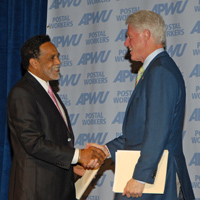
former U.S. President Bill Clinton to the stage
at the union’s All-Craft Conference.
“Don’t you dare let them take this election away from you,” Bill Clinton told more than 3,000 APWU members in a spirited, wide-ranging speech to the union’s All-Craft Conference Nov. 5 in Las Vegas.
The former president urged postal workers to help choose leaders who will tackle our biggest problems at home and abroad, and told them we will solve the problems of the 21st Century only when we recognize that “our common humanity is more important than our differences.”
“This is a really big election,” Clinton said. “We saw what happened in the last seven years. We made decisions in elections based on trivial matters.” He reminded the audience that Al Gore was ridiculed in 2000 for being stiff; that decorated Vietnam veteran and 2004 presidential candidate John Kerry was “Swift-Boated;” and that Sen. Max Cleland (D-GA) — who lost three limbs in Vietnam — was defeated in 2002 amid charges that he was “soft on terror” because he tried to preserve collective bargaining rights for Homeland Security Department workers. (The infamous Georgia campaign ads compared Cleland to Osama bin Laden and Saddam Hussein.)
“This election belongs to you, and to your children, and to the future of America,” Clinton told APWU members. “Don’t be divided,” he cautioned. “Our best days are still ahead. Claim them.”
Bedeviled by Three Problems
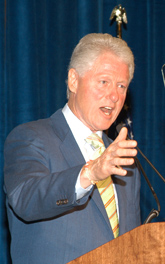 The former president offered a prescription for addressing the social, political and environmental problems facing the nation and the world in a 40-minute speech that delighted union members.
The former president offered a prescription for addressing the social, political and environmental problems facing the nation and the world in a 40-minute speech that delighted union members.
Both nationally and globally, he said, we are bedeviled by three major problems: persistent inequality in income, education, and health care; energy and environmental concerns, and terror.
“We keep being told that we’re in the sixth year of economic recovery,” he said. “And in gross economic statistics, we are. The problem is that almost 100 percent of the benefits have gone to the richest Americans.”
Clinton noted that a student who graduates high school in the top 25 percent of his class but who is in the bottom 25 percent in family income was less likely to go to college and graduate on time than a student from the bottom 25 percent of his class academically who ranks in the top 25 percent financially. “That is wrong; it is un-American, and we have got to do something about it.”
A World ‘Thrown Together’
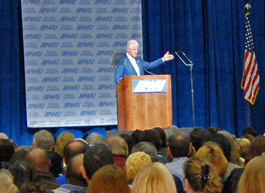 “The problems of the 21st Century are a manifestation of a world that is being thrown together” because of global warming and huge population increases, Clinton said. “And just one or two people who believe that our differences are more important than our common humanity can do a whole lot of damage.
“The problems of the 21st Century are a manifestation of a world that is being thrown together” because of global warming and huge population increases, Clinton said. “And just one or two people who believe that our differences are more important than our common humanity can do a whole lot of damage.
“We haven’t figured out how to build a fair and just and decent world, where we share benefits, share responsibilities,” he said. “We have at least one shared value. Our differences are really important. They make life more interesting… Our differences are good. But they can only be good if we can live with each other.”
“As interesting as we think our differences are, our common humanity matters more. That simple idea is the key to the success of humanity in the 21st Century.”
“We need to restore America’s standing in the world," Clinton added. "We need to send a message to the world that we’re back in the cooperation business… There are very few problems we can solve alone.” We should act alone only when we have to, the former president said, and we should use military force only as a last resort.
Soaking the Taxpayers
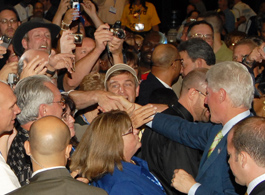
after speaking to the union's All-Craft Conference
Nov. 5 in Las Vegas.
Addressing problems that directly affect APWU members and other workers, Clinton said he opposes the privatization of public services, noting that subcontracting often proves to be more costly.
“I thank you for your steadfast opposition to privatization of the Postal Service and the unnecessary private contracting that’s been done in the last seven years, which I think has wasted a lot of money and undermined the public interest,” he said.
Referring to recent revelations that it costs more than twice as much for contract employees to provide diplomatic security and other services in Iraq, Clinton said, “I thought we were supposed to be contracting-out because it saved the taxpayers money, not soaked the taxpayers.”
Clinton also said he was proud that in the earliest days of his administration he signed into law the Family and Medical Leave Act, and restored political rights to postal and other government workers by revising the Hatch Act.
“Even though we’ll have to have another election to get it,” he praised union members “for demanding that the current president appoint people to the Labor Department and National Labor Relations Board who actually believe in the labor laws of America and think they ought to be enforced.”
Clinton also thanked the APWU for supporting the fight for occupational safety and health standards that protect American workers from repetitive motion injuries. Unfortunately, he noted, ergonomic standards his administration set were reversed soon after President Bush took office.
Hillary and 2008
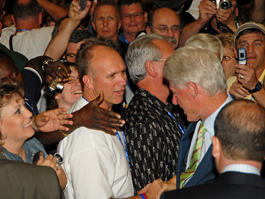 Speaking about the 2008 presidential election, Clinton said, “People ask me all the time, ‘how’s it going,’ or, ‘what do you think?’… I have never said a bad word about any of these other Democrats running for president. I like them all… I like this election because I don’t have to be against anybody.”
Speaking about the 2008 presidential election, Clinton said, “People ask me all the time, ‘how’s it going,’ or, ‘what do you think?’… I have never said a bad word about any of these other Democrats running for president. I like them all… I like this election because I don’t have to be against anybody.”
“Do I hope you vote for my wife?” he asked. “You bet I do. It’d be good for America, and good for the world.
“I feel very strongly that Hillary should win,” he said, adding that she would try to move the nation beyond the partisan political paralysis that keeps the nation from solving its biggest problems.
Noting that virtually nothing can pass in the Senate without a filibuster-proof majority, he said, “We can’t pass healthcare reform or energy reform without some Republican votes. “It’s important, I think, to elect someone who’s got a proven record of getting stuff done with the Republicans who are thinking and working and looking for tomorrow.”
“Everybody says they want to unify the country and they’re sick of the partisanship. I agree with that. But we’re not going to do it by talking and feel-good rhetoric.
“It will happen,” he said, when there’s a unifying force to “get people to do something together, so they get used being together, and working together, and learning about one another, and seeing that they’re not so different. That’s important.”
“There’s a lot of good in 21st Century America,” Clinton said. Looking into the audience he said, “It looks like America out here to me, and I like what I see.”



